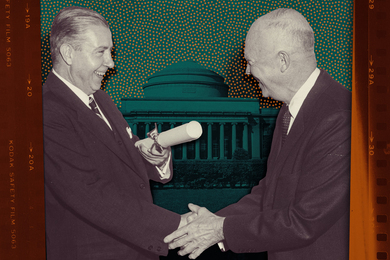Associate Professor Hari Balakrishnan of electrical engineering and computer science received the Harold E. Edgerton Faculty Achievement Award at the April 16 faculty meeting.
The faculty also heard a review of the Biological Engineering Division by Rafael Bras, the Bacardi and Stockholm Water Foundations Professor, and an update of discussions with officials from the new federal Department of Homeland Security on national security and scientific research by President Charles M. Vest.
The Edgerton Award was announced by John Sterman, the Standish Professor of Management and director of the System Dynamics Group. Sterman noted Balakrishnan's "intellectual breadth, depth and creativity" in teaching, research and scholarship in his field.
Balakrishnan, who holds the KDD Career Development Chair in Communications Technology, leads the Networks and Mobile Systems group at the Laboratory for Computer Science (LCS), exploring research issues in computer networks, wireless networking, mobile systems and pervasive computing.
"I'm surprised and honored to receive this prestigious award," said Balakrishnan, who arrived with an enthusiastic entourage just in time for Sterman's comments. "I have an excellent group of students, and this award is a reflection of just how good MIT students are! I thank my colleagues for making MIT a great place to be."
Balakrishnan joined the MIT faculty in 1998. He received a Ph.D. from the University of California at Berkeley in 1998 and a B.Tech. from the Indian Institute of Technology in 1993.
He was awarded the ACM Doctoral Dissertation Award for his work on wireless networks in 1998, the Ruth and Joel Spira Award for Distinguished Teaching in 2001 and the Junior Bose Award for Excellence in Teaching in 2002 from the School of Engineering.
Biological engineering
Bras advocated making the Biological Engineering Division a permanent academic unit at MIT with its own undergraduate major and a single leader. He recommended the biological engineering doctoral program be unified and that future students be recruited with "diversity" in mind.
"Biological engineering is a science and has achieved the objective of its creation. The problem is, the discipline has moved faster, especially in toxicology, than was perceived five years ago," said Bras.
Steven R. Tannenbaum, co-director of the Biological Engineering Division, thanked Bras' committee for its "thoroughness and effort" and pledged the division will soon be "number one in U.S. News & World Report."
Security and openness
Emphasizing the importance of maintaining the "traditional openness of our campus and our nation to talented people from all over the world," Vest described the "fair hearing" that he and five other university presidents had in an April 15 meeting with officials of the Department of Homeland Security in Washington, D.C. The meeting followed an earlier one with director Thomas Ridge.
Problems with visas and increasing restrictions on participants in certain research must still be resolved, but the university presidents were "optimistic about setting up mechanisms for conversation" among academic and government leaders, Vest said.






